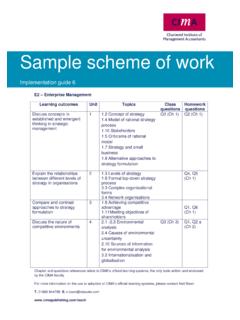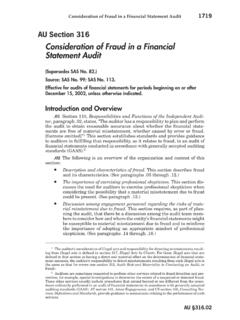Transcription of Negotiation - Chartered Institute of Management …
1 Topic Gateway Series Negotiation 1 Prepared by Alexa Michael and Technical Information Service March 2007 Negotiation Topic Gateway Series No. 25 Negotiation Topic Gateway Series 2 About Topic Gateways Topic Gateways are intended as a refresher or introduction to topics of interest to CIMA members. They include a basic definition, a brief overview and a fuller explanation of practical application. Finally they signpost some further resources for detailed understanding and research. Topic Gateways are available electronically to CIMA members only in the CPD Centre on the CIMA website, along with a number of electronic resources. About the Technical Information Service CIMA supports its members and students with its Technical Information Service (TIS) for their work and CPD needs.
2 Our information specialists and accounting specialists work closely together to identify or create authoritative resources to help members resolve their work related information needs. Additionally, our accounting specialists can help CIMA members and students with the interpretation of guidance on financial reporting, financial Management and performance Management , as defined in the CIMA Official Terminology 2005 edition. CIMA members and students should sign into My CIMA to access these services and resources. The Chartered Institute of Management accountants 26 Chapter Street London SW1P 4NP United Kingdom T. +44 (0)20 8849 2259 F. +44 (0)20 8849 2468 E.
3 Negotiation Topic Gateway Series 3 Negotiation Definition and concept What is Negotiation ? The process through which two or more parties who are in conflict over outcomes attempt to reach agreement. It is the constructive, positive alternative to haggling or arguing; it is aimed at building an agreement rather than winning a battle. Pillutla, M. and Nicholson, N. (eds). (2004). Negotiation : how to make deals and reach agreement When does Negotiation occur? Negotiation can occur in any business situation, but people negotiate in everyday situations outside of the workplace. It occurs when there is more than one possible outcome from a situation in which two or more parties have an interest, but they have not yet determined what the outcome will be.
4 For example, Negotiation occurs between a buyer and seller in the purchase of a second hand car, or even between groups of friends when they decide which film to see at the cinema. Business negotiations can include: producing deals with suppliers, partner businesses or customers inter-departmental or team discussions to determine aims, processes and resources Management and staff discussions to discuss job priorities and workload discussions between Management and trade unions, for example, rates of pay recruiting new people to the business, for example, interviews. In a way, both business relationships and personal relationships are shaped through the process of Negotiation . Success in both business life and personal life depends on having good Negotiation skills.
5 In practice, personal negotiations require essentially the same skills as business negotiations . Negotiation Topic Gateway Series 4 Context CIMA students are unlikely to study Negotiation for their professional examinations, but they will become involved in Negotiation at all stages during their professional careers. It will be to their career advantage to develop good negotiating skills at an early stage. Related concepts Discussion; agreement; compromise Overview Why learn to negotiate? Many situations will have more than one potential outcome. Learning how to negotiate enables individuals to understand fully how complex many situations are, and how to manage the situation more effectively. Good Negotiation skills are beneficial to both individuals and businesses.
6 The benefits to individuals are: better outcomes from negotiating situations resolving differences of opinion without bad feeling a better understanding of other parties aims, motivations and beliefs creating better business relationships less stressful negotiations . The benefits to businesses are: reduced costs and overheads through better deal making more opportunities for business development avoidance of the cost of failing to make crucial deals better relationships with stakeholders and other involved parties more positive and less stressful work and business relationships. Negotiation Topic Gateway Series 5 Goals and outcomes When negotiating, it is important to bear in mind that goals and outcomes are not the same thing.
7 Goals the needs, wants and preferences that individuals consider before they negotiate. Outcomes a possible result of Negotiation . Possible outcomes of Negotiation Three outcomes are possible when negotiating: 1. Win-win (both sides win). 2. Win-lose (one side wins, the other loses). 3. Inefficient but equitable (all items shared equally). Negotiating styles Negotiators can be either aggressive or co-operative in their personal style. Either style can be successful or not, and it is possible to adapt a style to meet individual situations. In addition, negotiators can be factual, relational (building relationships), intuitive or logical in their approach. In practice Negotiation in practice Goals Goals are the needs, wants and preferences that individuals bear in mind before they negotiate.
8 Goals are the why behind the want . If outcomes represent what somebody wants from a Negotiation , goals explain why they want it. A goal determines what outcomes are acceptable. If individuals decide on a particular outcome and try to achieve it, only that outcome is acceptable. Having goals means that Negotiation can result in more than one outcome. Individuals can then decide what is more acceptable. Not all goals will be equally important. Negotiation Topic Gateway Series 6 Outcomes An outcome is a possible result of Negotiation . Outcomes can be general or specific, factual or subjective, absolute or relative. If Negotiation only consists of both sides identifying a preferred outcome, making it their goal and forcing it on the other, haggling or arguing will result.
9 This results in an unwise decision (or no decision), inefficiency and potential damage to relationships. Entering negotiations with only a specific outcome in mind can be very counter-productive. Negotiators should consider the wider goals. Example A potential client negotiates with a contractor for an office cleaning contract. The goal is to have a well cleaned office by 9am each day, regardless of how many people or hours the contractor has to provide. One possible outcome of the Negotiation might be for the client to employ two people each day cleaning for two hours. To identify the goals, it is necessary to consider business goals ( hard goals) and cultural or personal issues ( soft goals). Hard goals Strategy - The long-term aims of the business.
10 Change - The need or desire to change the business in order to achieve a specific outcome. Adaption - The need to adapt to changes to ensure the continued survival of the business, or to move into new areas. Improvement - These aims could include greater efficiency, saving money, greater profit margins or streamlining processes. Growth - This might include increased turnover, new products and services, or product diversification. Project oriented goals - These goals will be directed at a specific outcome. Soft goals These are cultural factors (overall business culture, employee involvement and status within the business) and personal factors (motivation and ambition, peer pressure and insecurity). Negotiation Topic Gateway Series 7 Preparing to negotiate Before Negotiation starts, there are several steps to consider.












